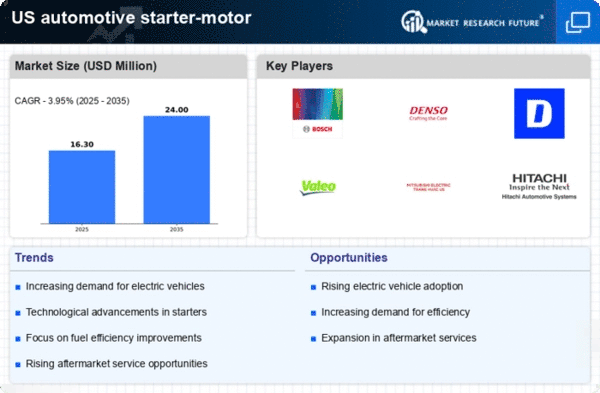Rising Vehicle Production Rates
The automotive starter-motor market is experiencing growth driven by increasing vehicle production rates in the US. In recent years, the automotive industry has seen a resurgence, with production levels reaching approximately 10 million units annually. This surge in vehicle manufacturing directly correlates with the demand for starter motors, as each vehicle requires a starter motor for ignition. The automotive starter-motor market is likely to benefit from this trend, as manufacturers ramp up production to meet consumer demand. Additionally, the introduction of new vehicle models, particularly in the SUV and electric vehicle segments, further fuels the need for advanced starter motor technologies. As production rates continue to rise, the automotive starter-motor market is poised for sustained growth, reflecting the overall health of the automotive sector.
Expansion of Aftermarket Services
The automotive starter-motor market is witnessing a notable expansion in aftermarket services, which is becoming a crucial driver of growth. As vehicles age, the need for replacement parts, including starter motors, increases. The aftermarket segment is projected to account for a substantial share of the automotive starter-motor market, with estimates suggesting it could reach $2 billion by 2026. This growth is attributed to the rising number of vehicles on the road, coupled with the increasing average age of vehicles, which now exceeds 12 years. Additionally, the trend towards DIY repairs and maintenance among consumers is further propelling the demand for aftermarket starter motors. As a result, companies are focusing on enhancing their distribution networks and product availability to cater to this growing segment, thereby driving overall market growth.
Growing Demand for Hybrid Vehicles
The automotive starter-motor market is experiencing a shift in demand due to the increasing popularity of hybrid vehicles. As consumers become more environmentally conscious, the market for hybrid vehicles is expanding, leading to a corresponding rise in the need for specialized starter motors. Hybrid vehicles often require advanced starter motors that can handle the unique demands of both electric and internal combustion engines. The automotive starter-motor market is likely to see significant growth as manufacturers develop products tailored to the specifications of hybrid models. This trend is further supported by government incentives promoting hybrid vehicle adoption, which could potentially increase market penetration. As the hybrid vehicle segment continues to grow, the automotive starter-motor market is expected to adapt and thrive in response to these evolving consumer preferences.
Increased Focus on Fuel Efficiency
The automotive starter-motor market is significantly influenced by the growing emphasis on fuel efficiency among consumers and manufacturers alike. With rising fuel prices and environmental concerns, there is a strong push for vehicles that consume less fuel. This trend has led to the development of more efficient starter motors that can enhance overall vehicle performance. For instance, advanced starter motors can reduce energy consumption during the ignition process, contributing to improved fuel economy. The automotive starter-motor market is adapting to these demands by innovating products that align with fuel efficiency goals. As a result, manufacturers are likely to invest in research and development to create starter motors that not only meet regulatory standards but also appeal to eco-conscious consumers, thereby driving market growth.
Technological Integration in Automotive Systems
The automotive starter-motor market is being propelled by the integration of advanced technologies within automotive systems. Modern vehicles are increasingly equipped with sophisticated electronic systems that require reliable and efficient starter motors. The automotive starter-motor market is adapting to these technological advancements by developing starter motors that can seamlessly integrate with electronic control units and other vehicle systems. This integration not only enhances the performance of starter motors but also contributes to the overall efficiency of the vehicle. Furthermore, the rise of smart vehicles and the Internet of Things (IoT) is likely to create new opportunities for innovation within the starter motor segment. As manufacturers continue to invest in technology, the automotive starter-motor market is expected to evolve, reflecting the changing landscape of the automotive industry.
















